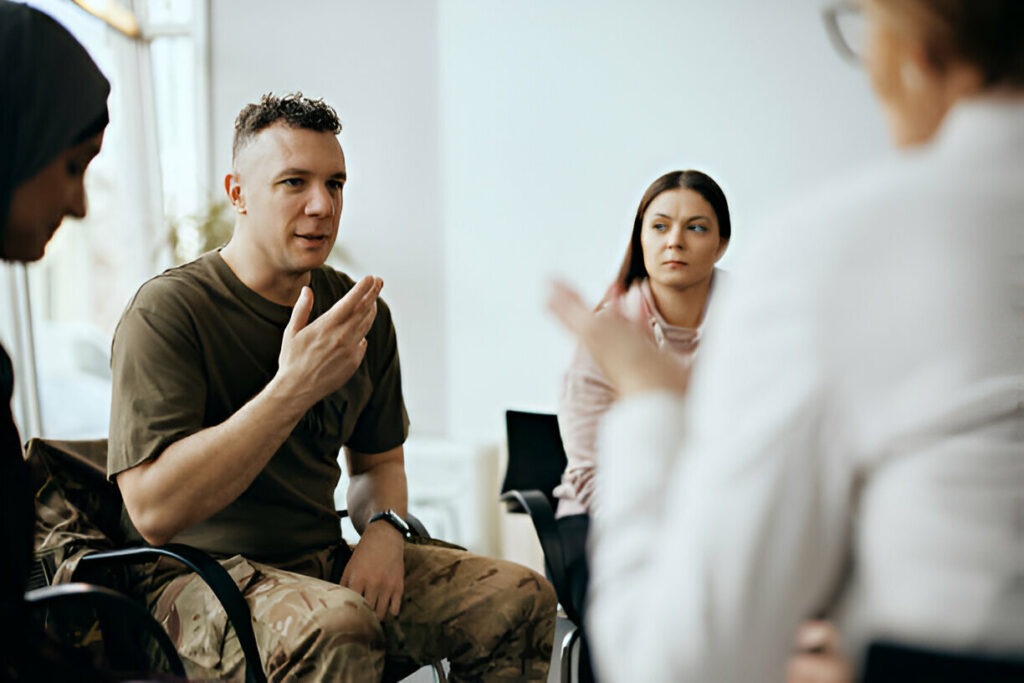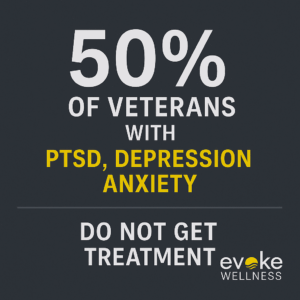If you’re a veteran, chances are you’ve heard it before: “Thank you for your service.” And while it’s said with good intent, those words can sometimes feel hollow—especially when what you really need is mental health support, and what you get is a slogan.
Because the truth is, civilian life doesn’t come with a transition manual. And if you’ve been living with PTSD, depression, or anxiety since returning home, you know how hard it is to ask for help in a world that doesn’t really understand what you’ve been through.
This guide is built for you—no fluff, no lectures, no guilt. Just the facts, the truth, and the support you actually deserve.
Why Veterans Don’t Ask for Help
Let’s be honest: asking for help isn’t second nature to most vets. You were trained to handle things, to adapt, to keep moving even when things hurt. So when emotions start to spiral or sleep disappears or trust feels like a luxury—you don’t always see that as a reason to call someone. You see it as your responsibility to manage.
But that mentality, while useful in service, can become a trap in civilian life. The pain just stacks. And when you do try to reach out? Civilians don’t always get it. Maybe a doctor downplayed your symptoms. Maybe a therapist gave you “self-care” tips that felt laughable next to what you’ve lived through.
It’s not just pride. It’s protection. You’ve been taught that vulnerability is dangerous—and experience has shown you that not everyone knows how to handle your truth.
PTSD, Depression & the Civilian Disconnect
Post-traumatic stress isn’t something you can white-knuckle through. Depression doesn’t disappear because you “have a lot to be grateful for.” These are neurological, emotional, and relational conditions—rooted in real experiences.
For many veterans, PTSD looks like:
-
Hypervigilance in safe places
-
Flashbacks that hijack your body
-
Sleep that feels like a battle zone
-
Sudden rage or numbness
Depression can sneak in differently:
-
Disconnection from family or friends
-
Loss of interest in things you used to care about
-
Feelings of hopelessness or shame
-
Struggles with motivation or energy
What makes it harder? Civilian responses. People don’t understand why you can’t “just let it go.” Or they assume trauma only comes from combat, not the moral injuries of leadership decisions, betrayal, or survivor’s guilt.
That mismatch leaves a lot of veterans feeling unseen. You might even start questioning your own reactions, wondering if maybe you’re just weak or “crazy.” You’re not. Your brain and body adapted to survive something hard. Now they need space to recalibrate.
What Makes Veteran-Focused Programs Different
You don’t need someone to coddle you—you need someone who gets it. Veteran-focused mental health programs are designed to do just that.
Here’s what sets them apart:
-
Shared Language: You won’t have to explain acronyms or rephrase your experience to make it palatable.
-
Trauma-Competent Clinicians: These therapists are trained in combat-related trauma, moral injury, and military culture.
-
Peer Connection: Group therapy with other veterans offers validation you can’t fake.
-
Holistic Support: Veteran programs often address not just mental health, but identity loss, purpose, and reintegration struggles.
These programs aren’t about turning you into someone else. They’re about helping you reconnect with the strongest, calmest version of yourself—the one that can move forward without pretending everything is fine.
Therapy That Respects You
Not all therapy is created equal. Some vets have tried therapy and left feeling worse—misunderstood, judged, or emotionally exposed without a safety net.
Respectful therapy means:
-
You set the pace.
-
Your experience is honored, not pathologized.
-
You don’t have to relive trauma to work through it.
-
You’re never told to “just talk about your feelings” with someone who hasn’t earned your trust.
Modalities like EMDR (Eye Movement Desensitization and Reprocessing), Cognitive Processing Therapy, and Narrative Therapy can be especially helpful for trauma-related conditions. But equally important is the relationship—knowing the person across from you is listening for understanding, not just checking boxes.
Frequently Asked Questions About Mental Health Support for Veterans
What mental health conditions are most common among veterans?
PTSD, depression, anxiety, and adjustment disorders are especially common. Some veterans also experience moral injury or survivor’s guilt, which don’t always fit into clinical boxes but can deeply affect well-being.
I don’t have PTSD. Do I still qualify for a veterans program?
Absolutely. Veteran programs are built for the entire spectrum of mental health needs—from daily stress to deep trauma. You don’t have to have a diagnosis to deserve help.
Will I be in a group with civilians?
In veteran-focused programs, group therapy is typically just for veterans. This creates a shared environment of mutual understanding and trust.
Is it confidential? I don’t want this affecting my job or benefits.
Yes. Mental health treatment is confidential under HIPAA. It will not be shared with your employer or the VA unless you give written permission.
How is Evoke Wellness different?
We offer a veterans program grounded in cultural competence, trauma-informed therapy, and peer support. Our team understands the unique experiences of veterans—and we never treat you like a diagnosis.
Getting Started
It’s okay if you’re skeptical. It’s okay if you’re tired. What matters is that support exists—and it’s different from what you may have tried before.
Evoke Wellness offers a Veterans Mental Health Support Program that combines evidence-based care with real respect for your service, your story, and your autonomy. We don’t expect you to show up fully trusting. We just ask that you show up.
Ready to talk to someone who actually gets it? Call us at (866) 429-2960. We’re here when you’re ready.



